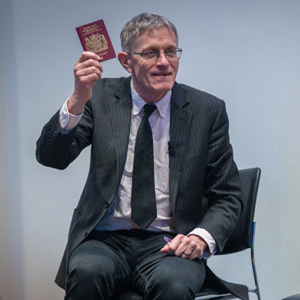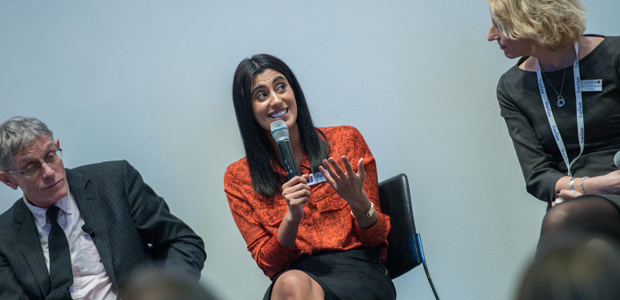Brexit uncertainty, protection confusion and operators’ liability dominated travel law specialist’s annual forum. Ian Taylor reports
‘Atol is an odd insurance that is no longer needed
Atol has “no meaning to the average traveller”, is “not good value” and is “not needed any more”.
That is the view of consumer travel journalist Simon Calder, who told the industry audience at a Travlaw event in London earlier this year: “In collapse after collapse, we’ve seen the first line of defence of the CAA [which runs the scheme] is: ‘You booked with a credit card, talk to them.’
“Atol has a residual purpose for the very small proportion of people who are on holiday when [a company like] Monarch goes bust. The CAA will phone up the hotel and say, ‘Don’t kick them out, we’ll pay the bill,’ although anecdotal evidence suggests that didn’t work [in the Monarch case].
 “So Atol might be useful in a narrow range of circumstances, if you’ve not paid with a credit card or you happen to be abroad when a company collapses.”
“So Atol might be useful in a narrow range of circumstances, if you’ve not paid with a credit card or you happen to be abroad when a company collapses.”
Calder insisted: “I see Atol as a niche product that has almost no meaning to the average traveller.”
He described the scheme as “this very odd bit of insurance people are paying [when] the chances anything is going to happen are very, very low”.
“In effect, they are paying for the cowboys and bottom feeders – it’s not very good value.” The government set up an Airline Insolvency Review in the wake of Monarch’s collapse in October 2017. The review is due to recommend possible changes to airline-insolvency procedures, with Abta demanding a levy on all flights to pay for future failures.
But Calder dismissed demands for a levy. He said: “I hope to see the review say ‘Atol isn’t needed. We’re going to get rid of it – and we are certainly not going to put a £1 levy on a Ryanair flight.’ There is absolutely no chance Ryanair is going out of business.
Consumers don’t understand LTAs, says lawyer Azam
Linked Travel Arrangements “don’t make sense” to consumers, who “probably assume they have a package”, says an industry lawyer.
Travlaw partner Farina Azam said: “The phrase Linked Travel Arrangement [LTA] means nothing to a customer. It creates confusion. If someone books an LTA they probably assume they booked a package. There should be a statement making clear you don’tget package rights.”
Azam told Travel Weekly: “It’s mainly airlines [selling LTAs]. You book a flight and a pop-up asks, ‘Do you want accommodation or car hire?’ It’s a targeted ad. Click on the link and you’re sent to a third party. If you book within 24 hours, it becomes an LTA.”
She said: “We tell clients they need to give notice with the targeted email, saying ‘If you book within 24 hours it creates an LTA and this is what it means.’”
But she noted the first seller “probably wouldn’t know a [second] booking was made” unless informed by the second retailer, “so the only way to comply would be to protect everything”.
Azam said: “There is also confusion around the financial protection for LTAs. The facilitator [of the link] only has to protect the payment they receive. An airline will collect the flight payment but not a car-hire payment. It’s not something consumers understand.”

‘Consumer media’s Brexit nonsense hit travel sales’
Uncertainty about Brexit, fuelled by “lots of nonsense” in the consumer media, has affected holiday bookings.
Consumer travel journalist Simon Calder told the Travlaw Big Tent Event: “The Sunday Times ran a story saying ‘Don’t book a holiday after March 29’. There was absolutely no substance to it. It was complete nonsense. So long as you book a package holiday, there is nothing to worry about.
“There is lots of nonsense, but the reason is there is this vacuum about what is going to happen. People don’t even know if their passports will be valid.
“A reporter contacted seven travel insurance companies to ask, ‘If I book a holiday, will I be covered in the event of a no-deal Brexit?’ Two companies said ‘you’re not covered’, four said ‘we don’t know’ and one said ‘you’ll be fine’. It isn’t great to get that level of divergence.”
Calder said: “Hands up anybody who knows what’s going to happen. Passports, we do know a bit about; they are going to turn the same colour as North Korea’s.
“Ehic cards [European Health Insurance], nobody has a clue. Your driving licence will stop being an EU driving licence and you’re going to have to get not one but two international driving permits.
“All sorts of things could happen. Portugal came out and said, ‘British people, we know you’re upset but you can still come to Portugal and we’ll give you free medical treatment and have a special lane for UK visitors,’ which is great.”
Lucia Rowe, A-Rosa River Cruises’ managing director for the UK and Ireland, said: “We’re a German company not only operating from the UK but increasing capacity and setting up offices here. We believe we have a wonderful opportunity. However, we would prefer Britain not to go or for Brexit to happen in an orderly manner.”
She added: “There have been very negative reports in Germany, where the media is normally restrained. Our bookings were affected. The media definitely has an impact.”
Travlaw partner Farina Azam said: “There is a lot of uncertainty, but I have complete confidence the industry will come through.”
Tui should fight claim for Sousse damages, says lawyer
Tui should fight legal action it faces over the massacre of 30 customers who were among the 38 victims of the terror attack in Tunisia in 2015, an industry lawyer has suggested.
Travlaw partner Farina Azam noted the case relating to the attack on a beach near Sousse has “farreaching” implications but “could potentially be cheaper to settle”.
A group of more than 80 people is seeking damages in a case brought by law firm Irwin Mitchell alleging that security at the Imperial Marhaba Hotel and information provided by Tui were inadequate.
Azam said: “The issue is whether Tui is liable for sending holidaymakers to Tunisia when there was terrorist activity. There had been a terrorist attack two months earlier [in Tunis] and one two years before.”
But she said: “The Foreign Office [FCO] did not advise travellers not to go to Tunisia, and most tour operators rely on FCO advice. If Tui is found liable, it is going to mean you can’t follow FCO advice.”
She added: “After the inquest, one of the main suggestions [by the coroner] was to put more emphasis on FCO advice.
“From an industry perspective, I think it would be beneficial for Tui to fight the claim because the implications could be far-reaching; however, I appreciate it’s much more complicated than that for Tui.”

